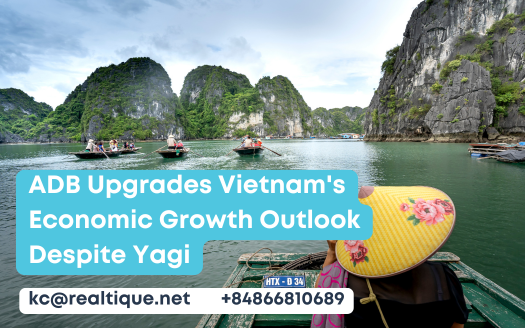ADB Upgrades Vietnam’s Economic Growth Outlook Despite Yagi
The Asian Development Bank’s recent upgrade of Vietnam’s economic growth outlook reflects a promising path, with projected GDP growth rates of 6% for 2024 and 6.2% for 2025. This optimism is highlighted by impressive industrial growth and substantial foreign direct investment. However, the nation faces significant challenges, including inflationary pressures and the aftermath of Typhoon Yagi. As Vietnam maneuvers through these intricacies, the effectiveness of its monetary policies will be essential in determining the sustainability of its economic momentum. What strategies might the government implement to strengthen resilience in the face of these uncertainties?
Table of Contents
Vietnam Economic Growth Projections
Although external environmental challenges persist, the Asian Development Bank (ADB) has projected Vietnam’s GDP growth to remain strong at 6% for 2024, with a slight increase to 6.2% anticipated in 2025.
This resilience is highlighted by a stable inflation forecast of around 4%, reflecting effective monetary policy management. The economic outlook remains optimistic, strengthened by vigorous performances in various sectors, including industrial growth of 7.5% and a notable trade surplus.
Additionally, foreign direct investment inflows have reached 15.2 billion USD in early 2024, indicating sustained investor confidence in Vietnam’s economic potential.
While challenges remain, the ADB’s forecast signals a commitment to maintaining growth momentum and addressing emerging vulnerabilities through strategic policy interventions.
As Typhoon Yagi swept through the Northern regions of Vietnam, it resulted in an estimated economic loss of 40,000 billion VND, underscoring the significant impacts of natural disasters on the economy.
The aftermath of the typhoon is projected to reduce GDP growth by 0.15%, highlighting the vulnerability of economic structures to environmental challenges.
Preliminary assessments indicate widespread damage to infrastructure, agriculture, and local businesses, which could strain recovery efforts.
The Asian Development Bank (ADB) emphasizes the need for ongoing monitoring of the economic effects related to the typhoon.
Future recovery initiatives may necessitate substantial government intervention and support to mitigate long-term impacts and restore stability in affected areas, ensuring that the economy can rebound effectively from this natural disaster.
Vietnam's Sectoral Growth Insights
Regularly, Vietnam’s economy demonstrates strong sectoral growth, particularly in the industrial and construction sectors, which recorded a notable increase of 7.5% in early 2024.
This growth is reinforced by significant advancements in rubber and electronics manufacturing, contributing to a sturdy trade surplus with exports rising by 14.5%. Meanwhile, imports surged by 17%, reflecting a heightened domestic demand.
The services sector is also experiencing a resurgence, largely attributed to the rebound in tourism following the pandemic.
These sectoral movements not only highlight Vietnam’s economic resilience but also emphasize the importance of strategic investments and policy structures to sustain this momentum.
Foreign Direct Investment Trends
Utilizing foreign direct investment (FDI) has become an essential strategy for Vietnam’s economic development, as evidenced by the inflows reaching 15.2 billion USD in early 2024.
This extraordinary achievement highlights the growing confidence of international investors in Vietnam’s economic environment.
The disbursement of FDI funds has also reached 10.8 billion USD, marking the highest rate in five years.
Such investments are crucial to sustaining growth, nurturing innovation, and creating job opportunities.
- Hope for a prosperous future as global companies invest in local talent.
- Strengthening local economies through enhanced infrastructure and technology.
- Building a resilient workforce that can thrive in a competitive market.
These trends emphasize Vietnam’s commitment to positioning itself as a favorable investment destination.
Vietnam's Economic Challenges Ahead
The economic environment in Vietnam faces several challenges that could impede growth prospects in the near future. Domestic demand growth has fallen short of expectations, recording only 8.5%, which may hinder overall economic momentum.
Additionally, inflationary pressures and external economic vulnerabilities present significant risks that could disrupt stability. The country’s dependence on favorable global trade conditions highlights the need for vigilance in monitoring international market shifts.
Typhoon Yagi’s aftermath signals potential economic strain, with damages estimated at 40 trillion VND and a projected GDP reduction of 0.15%.
To counter these challenges, the government is urged to implement fiscal stimulus measures aimed at enhancing local consumption and strengthening economic resilience amidst changing circumstances.





